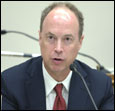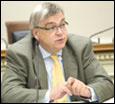Stable Banks, Stable Finance: Is the Canadian Experience a Model for the U.S.?
The Wilson Center on the Hill program and the Canada Institute hosted a forum featuring Nick Le Pan and Douglas J. Elliott explored the differences between Canada's financial system and regulatory structure and those of the United States and discussed lessons that could be taken from the Canadian experience.
Overview
The Wilson Center on the Hill program and the Canada Institute hosted a forum examining Canada's better-than-average weathering of the global financial crisis. The panel explored the differences between Canada's financial system and regulatory structure and those of the United States, and discussed lessons that could be taken from the Canadian experience. David N. Biette, director of the Canada Institute at the Woodrow Wilson Center, moderated the panel featuring Nick Le Pan, former Canadian Superintendent of Financial Institutions, and Douglas J. Elliott, a fellow in Economic Studies at the Brookings Institution.
Le Pan outlined some of the practices that helped Canada endure the recent downturn in the global economy. He noted that while Canada has withstood the crisis relatively well, it has not been completely immune. He attributed the economic success to sound monetary and fiscal policies, combined with more conservative mortgage policies that lessened the chance of a mortgage bubble in Canada. For example, Canadians are required to purchase government insurance for high-ratio mortgages (those with less than 20 percent down), fixed-rate mortgages are available for a maximum of five years, and banks own nearly all of the mortgages. These practices reduce the risk held by banks. Le Pan also explained that Canada possesses a different mortgage industry structure than the United States: because its major investment banks are owned by commercial banks, stock options are not given to board members, and the majority of corporations separate the roles of CEO and chair. This structure has helped minimize incentives for banks to take excess amounts of risk, he explained.
Elliott pointed out that while these and other conservative practices, such as the lack of tax deductions for mortgages in Canada, significantly reduced the chances of a housing bubble there, the United States is unlikely to neither reduce the tax deduction on mortgages nor require 20 percent down. "It is simply not part of our culture," Elliott said. Canadian culture is generally more conservative, especially with regard to risk, than what one finds in the United States, and there is a greater willingness to accept government intervention in Canada. Canadian banks are less averse to work with the government than American banks, and tend to be more careful about their lending practices. While these policies may protect the economy, it is difficult to imagine a culture change in the U.S. system that would allow adoption of similar policies.
 Elliott further noted that Canada's financial sector is dominated by five major banks, far fewer than in the United States. Therefore, it is simply easier for regulators to keep track of fewer banks, he said. As long as the United States has "cowboy banks" that are taking large risks to maximize profits, the U.S. government will have a hard time regulating the whole industry.
Elliott further noted that Canada's financial sector is dominated by five major banks, far fewer than in the United States. Therefore, it is simply easier for regulators to keep track of fewer banks, he said. As long as the United States has "cowboy banks" that are taking large risks to maximize profits, the U.S. government will have a hard time regulating the whole industry.
While Le Pan agreed that there is dissimilarity between the two systems, he suggested that certain steps that Canada has adopted could be very effective in the United States. Le Pan said he could not overemphasize the importance of possessing a single, comprehensive, consolidated regulator for the financial services industry. In Canada this agency is the Office of the Superintendent of Financial Institutions (OSFI), whose mandate is to supervise financial and insurance institutions, and examine them for safety and soundness. Elliott agreed with Le Pan, stating that the United States desperately needs to consolidate its overabundant number of regulators. The more regulators there are, he said, the more overlapping and miscommunication there is, and the more likely it is that Wall Street will be able to find the cracks. Elliott stated that the Fed seems to be the "least bad option" for a systemic regulator in the United States, but that it will be difficult to push the idea of a single regulator through Congress because of parochial political interests.
 Le Pan suggested that clear mandates and accountability for the regulator are also essential. The regulator must be clear about its goals and have unambiguous and effective punishments for banks that do not comply with policy. He also said that there must be a culture of openness between the regulator and other government institutions, such as the Central Bank. Information should be shared between agencies, with open communication and cooperation to achieve consensus. For example, when the regulator implements a new policy, it should also be supported by the central bank. Without such consensus, agencies end up working against each other instead of working towards a common goal.
Le Pan suggested that clear mandates and accountability for the regulator are also essential. The regulator must be clear about its goals and have unambiguous and effective punishments for banks that do not comply with policy. He also said that there must be a culture of openness between the regulator and other government institutions, such as the Central Bank. Information should be shared between agencies, with open communication and cooperation to achieve consensus. For example, when the regulator implements a new policy, it should also be supported by the central bank. Without such consensus, agencies end up working against each other instead of working towards a common goal.
Le Pan additionally stressed that regulatory policies must be continually reviewed and updated in order to keep them relevant. OSFI policies in Canada have "sunset clauses," which require that they be re-evaluated every five years.
Finally, Elliott observed that part of the reason that Canadian banks have fared better in the global downturn is because they simply made better choices in their investments. Nothing stopped Canadian banks from loading up on sub-prime mortgages as did banks in many other countries. Elliott recommended that in order to increase good decision making in the future, the United States must increase transparency and reduce the complexity of the derivatives being sold. Regulators should also increase capital and liquidity requirements, Elliott said. Requiring banks to hold higher levels of capital would increase the opportunity cost of certain investments, forcing bankers to step up analysis of their ventures and thus make better decisions.
Ultimately, while both bankers and policymakers are integrating into their practices many of the lessons learned from the Canadian experience, the panel agreed that what helped Canada to survive the financial crisis is an instrument that the United States has yet to adopt—a single, consolidated, financial regulator.
Drafted by Brant Howell, STAGE
Edited by David Klaus, Wilson Center on the Hill
Hosted By

Canada Institute
The mission of the Wilson Center's Canada Institute is to raise the level of knowledge of Canada in the United States, particularly within the Washington, DC policy community. Research projects, initiatives, podcasts, and publications cover contemporary Canada, US-Canadian relations, North American political economy, and Canada's global role as it intersects with US national interests. Read more
Thank you for your interest in this event. Please send any feedback or questions to our Events staff.










